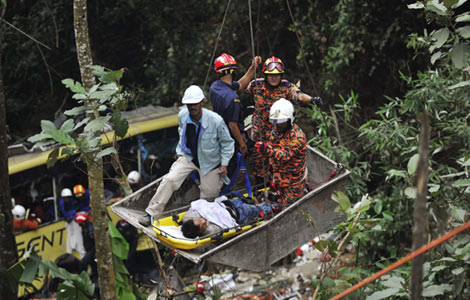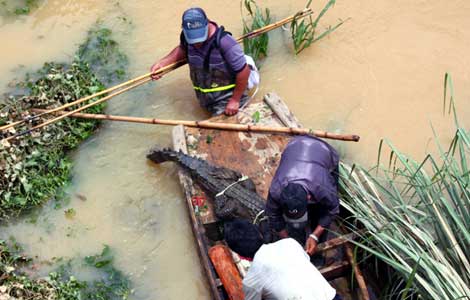Disaster alert system
Updated: 2013-08-22 07:41
(China Daily)
|
||||||||
Despite the contingency plans in place in the event of natural disasters, the heavy death toll caused by recent flooding across China has exposed the absence of a timely and effective early-warning mechanism.
On Tuesday afternoon, a fierce rainstorm hit Wulan county in northwestern Qinghai province and flood waters swept through a construction site, leaving 24 workers dead.
Heavy flooding and landslides in the country's south and northeast following torrential rains and a typhoon in recent days have already left more than 200 people dead or missing.
The deadly floods in Guangdong province, the Guangxi Zhuang autonomous region and Hunan province in the aftermath of typhoon Utor, which was the worst typhoon in 60 years, left about 50 people dead. And in China's northeastern regions, which have suffered from the worst floods in decades, 85 people have died and more are missing.
In the face of these devastating floods, people have displayed great courage. However, the saddening pictures on the Internet showing people struggling to stay afloat in torrents of water and perched on trees, has also exposed people's vulnerability.
Under the calls from top leaders that "all-out rescue efforts should be made and people's lives should be the priority", government-organized rescue teams, including a number of military teams, were mobilized to give a helping hand and played a positive role in saving more lives.
But serious traffic paralysis in some affected areas, the fact that most people had to try and save themselves and the inadequate storm warning system have offered much food for thought.
It is reported that residents in Fushun, Liaoning province, failed to receive any orders of withdrawal from local authorities before the storms arrived. In Dianbai county, Guangdong province, amplifiers and drums were used to urge people to leave.
In this day and age, when we have highly developed meteorological technologies, reasonably accurate weather forecasts are not that difficult, so it should be possible to issue warnings by means of television, radio, the Internet, cellphones and other means. So why were no effective warnings given?
This question should be left to relevant departments to think about before the arrival of the next natural disaster.
(China Daily USA 08/22/2013 page11)

 Manning gets 35 years in WikiLeaks trial
Manning gets 35 years in WikiLeaks trial
 At least 37 killed in Malaysian bus crash
At least 37 killed in Malaysian bus crash
 FM calls for closer Cambodia relations
FM calls for closer Cambodia relations Problems for rural kids in cities
Problems for rural kids in cities
 Search for escaped crocodiles continues
Search for escaped crocodiles continues
 Police break up baby trafficking ring
Police break up baby trafficking ring
 Jeremy Lin celebrates birthday in basketball clinic
Jeremy Lin celebrates birthday in basketball clinic
 Police identify suspect in US school shooting
Police identify suspect in US school shooting
Most Viewed
Editor's Picks

|

|

|

|

|

|
Today's Top News
Bo Xilai stands trial for bribery, embezzlement
Affluent tourists 'go it alone'; seek culture, good food
Sales of iPad fall as Android-based devices gain
Manning gets 35 years in WikiLeaks trial
Chinese workers detained in Russia
US spying raises tensions with China
Wildlife plan struck with Kenya
Egypt court orders Mubarak's release
US Weekly

|

|







